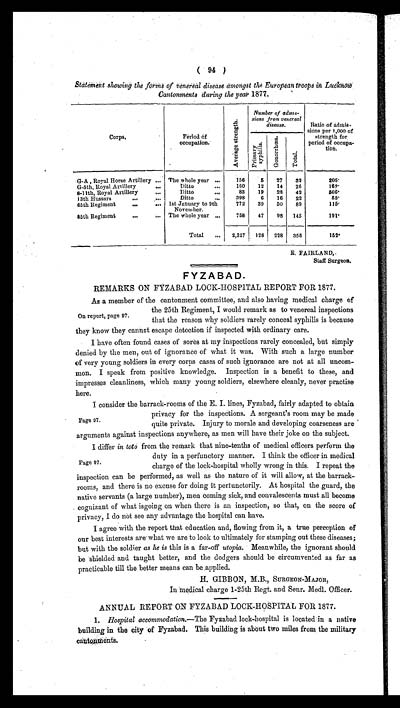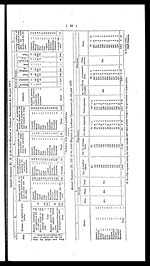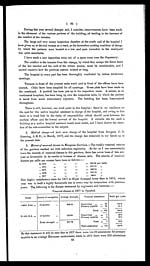Medicine - Institutions > Lock hospitals > Annual report on the working of the lock hospitals in the North-Western Provinces and Oudh > Fourth annual report on the working of the lock-hospitals in the North-Western Provinces and Oudh for the year 1877
(102) Page 94
Download files
Individual page:
Thumbnail gallery: Grid view | List view

( 94 )
Statement showing the forms of venereal disease amongst the European troops in Lucknow
Cantonments during the year 1877.
| Corps. | Period of occupation. |
Average strength. | Number of admis- sions from venereal disease. |
Ratio of admis- sions per 1,000 of strength for period of occupa- tion. |
||
| Primary syphilis. |
Gonorrhœa. | Total. | ||||
| G-A , Royal Horse Artillery | The whole year | 156 | 5 | 27 | 32 | 205. |
| G-5th, Royal Artillery | Ditto | 160 | 12 | 14 | 26 | 162. |
| 8-11th, Royal Artillery | Ditto | 83 | 19 | 23 | 42 | 506. |
| 13th Hussars | Ditto | 398 | 6 | 16 | 22 | 55. |
| 65th Regiment | 1st January to 9th November |
772 | 39 | 50 | 89 | 115. |
| 85th Regiment | The whole year | 758 | 47 | 98 | 145 | 191. |
| Total | 2,327 | 128 | 228 | 356 | 152. | |
E. FAIRLAND,
Staff Surgeon.
FYZABAD.
REMARKS ON FYZABAD LOCK-HOSPITAL REPORT FOR 1877.
On report, page 97.
As a member of the cantonment committee, and also having medical charge of
the 25th Regiment, I would remark as to venereal inspections
that the reason why soldiers rarely conceal syphilis is because
they know they cannot escape detection if inspected with ordinary care.
I have often found cases of sores at my inspections rarely concealed, but simply
denied by the men, out of ignorance of what it was. With such a large number
of very young soldiers in every corps cases of such ignorance are not at all uncom-
mon. I speak from positive knowledge. Inspection is a benefit to these, and
impresses cleanliness, which many young soldiers, elsewhere cleanly, never practise
here.
Page 97.
I consider the barrack-rooms of the E. I. lines, Fyzabad, fairly adapted to obtain
privacy for the inspections. A sergeant's room may be made
quite private. Injury to morale and developing coarseness are
arguments against inspections anywhere, as men will have their joke on the subject.
Page 97.
I differ in toto from the remark that nine-tenths of medical officers perform the
duty in a perfunctory manner. I think the officer in medical
charge of the lock-hospital wholly wrong in this. I repeat the
inspection can be performed, as well as the nature of it will allow, at the barrack-
rooms, and there is no excuse for doing it perfunctorily. At hospital the guard, the
native servants (a large number), men coming sick, and convalescents must all become
cognizant of what isgoing on when there is an inspection, so that, on the score of
privacy, I do not see any advantage the hospital can have.
I agree with the report that education and, flowing from it, a true perception of
our best interests are what we are to look to ultimately for stamping out these diseases;
but with the soldier as he is this is a far-off utopia. Meanwhile, the ignorant should
be shielded and taught better, and the dodgers should be circumvented as far as
practicable till the better means can be applied.
H. GIBBON, M.B., SURGEON-MAJOR,
In medical charge 1-25th Regt. and Senr. Medl. Officer.
ANNUAL REPORT ON FYZABAD LOCK-HOSPITAL FOR 1877.
1. Hospital accommodation.—The Fyzabad lock-hospital is located in a native
building in the city of Fyzabad. This building is about two miles from the military
cantonments.
Set display mode to: Large image | Zoom image | Transcription
Images and transcriptions on this page, including medium image downloads, may be used under the Creative Commons Attribution 4.0 International Licence unless otherwise stated. ![]()
| Permanent URL | https://digital.nls.uk/75111137 |
|---|




